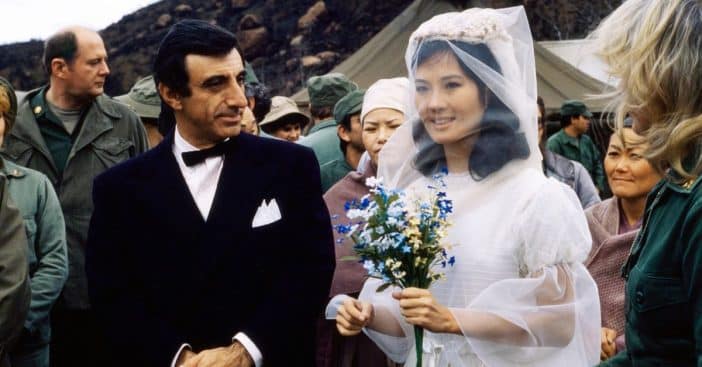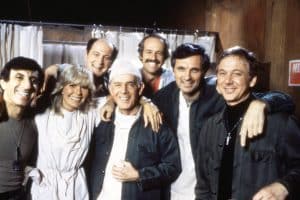
Few shows can not only last for several seasons but then stick the landing, even before streaming services left the fate of so many programs up in the air. M*A*S*H broke the mold by succeeding on both these fronts and made history with its finale boasting numbers that can’t actually be beaten.
In fact, to this day, if you look up “most watched finale of all time,” you’ll be presented with 1983’s “Goodbye, Farewell and Amen,” which enjoyed 105 million viewers. That’s 20 million viewers more than second place with Cheers in 1993. It’s been decades and nothing has beaten it yet – and nothing will. Why?
The numbers the ‘M*A*S*H’ finale reached can’t be beaten today

The answer comes right back to streaming. Watching a series of any kind isn’t as simple as tuning into a specific channel and network anymore – not by a long shot. Programs can’t even be called “television shows” anymore; they’re more of series hosted on some streaming platform or another. Netflix exclusives, Apple TV+ ownership battles, HBO Max’s growing and shrinking library. The way people watch shows has forever changed thanks to the advent of streaming services.
RELATED: A New ‘M*A*S*H’ Scene By ChatGPT, Read By Hawkeye And B.J.
This has led to the creation of a new phenomenon: cord cutting, where a household gets rid of cable all together. So, if they want to watch that new HBO drama? They can catch it whenever they want on HBO Max, instead of tuning in with millions of their peers at the same time on Sunday evening, eliminating an environment of solidarity and community among fans.
In fact, eMarketer anticipates that by the end of this year, the number of households engaging in cord cutting is expected to be 46.6 million. So, even the most anticipated programs simply can’t generate that much synchronized excitement and viewership. Sticking with HBO Max, the House of the Dragon season finale drew in 9.1 million viewers that Sunday night. That’s a lot but barely a blip compared to what the M*A*S*H achieved and it can’t possibly be beaten because of how distilled a popular show’s presence has become thanks to streaming services.
The digital age is reshaping how – and what – people watch

The stars really aligned for the M*A*S*H finale to secure the revelry it did. As Screen Rant notes, its focus on the Korean War played in the show’s favor. Enough time had passed that viewers could look back with some safe distance, while other viewers had been involved enough to feel a connection. On top of that, it aired during the Vietnam War, making the subject matter still topical while giving them a prime chance to forge some relevant commentary, presenting ideas of patriotism and anti-war sentiments coexisting.

No other show, the outlet argues, is quite touching on such a profound, universal experience to the extent that M*A*S*H addressed – and those that do aren’t lasting too long in the upstream fight a lot of programs face to stay on air. Modern Family, which was designed to welcome all sorts of demographics, enjoyed 7.4 million viewers for its finale, but it doesn’t even make the top 20 most notable finales of all time – and this actually represented a ratings boom for the show after rocky feedback in the middle.
M*A*S*H, in contrast, got off to a rocky start before finding its footing and cultivating such a following that its finale success will never be beaten.
